European Women’s Lobby at CSW68 - combating women’s poverty
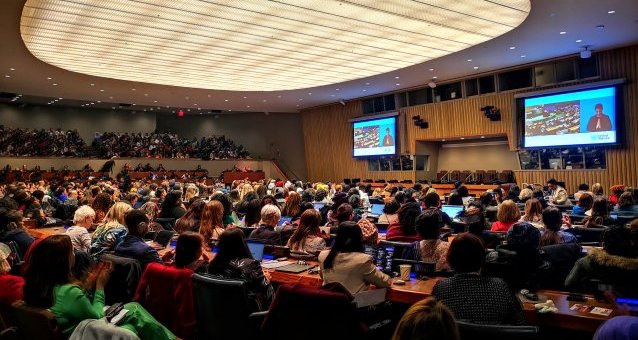
[Brussels, April 2024] The 68th annual Commission on the Status of Women (CSW68) took place in New York from 11 to 22 March 2024. This year’s priority theme was ‘Accelerating the achievement of gender equality and the empowerment of all women and girls by addressing poverty and strengthening institutions and financing with a gender perspective”, a crucial topic as 10.3 per cent of women live in extreme poverty today and progress towards ending poverty needs to be 26 times faster to achieve the Sustainable Development Goals by 2030 according to the UN Secretary General.
The CSW is the largest annual multilateral meeting on women’s rights, bringing together world leaders, ministerial delegations and women’s non-governmental organisations, all generating a hive of activity. This year, the CSW brought together world leaders – including two Heads of State, three vice-presidents and over 100 Ministers – and 4,800 representatives of civil-society organisations, marking the second-highest attendance in CSW records.
The European Women’s Lobby (EWL) has been engaging in the CSW for many years and there is a consensus among members that the CSW is a strategic place to be. This year, the EWL delegation was composed of Iliana Balabanova (President), Mary Collins (Secretary General), Laura Kaun (Director of Policy and Campaigns) and Alexia Fafara (Policy and Campaigns Officer).
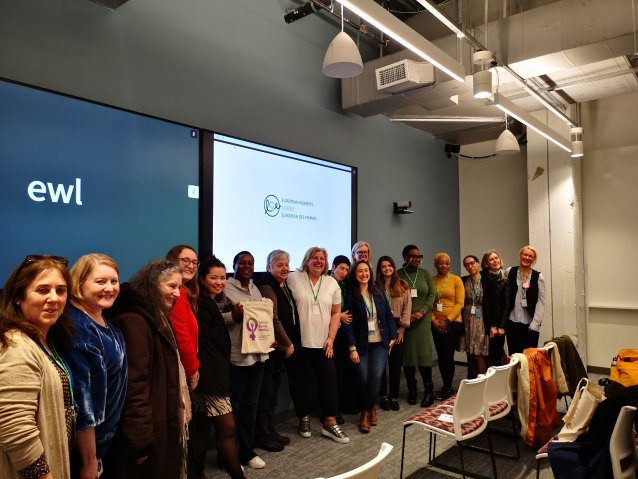
During CSW68, EWL organised two side events. The first was co-organised with Global Rights for Women on the topic of combating violence against women and domestic violence through transnational feminist solidarity and took place on 11 March. In this session, the EWL and Global Rights for Women brought together diverse stakeholders to share best practices in combating violence against women and domestic violence. The discussion offered a transnational perspective, covering developments at the EU and global levels, including the EU Directive on combating violence against women and domestic violence. Emphasis was placed on a coordinated community response model and a survivor-centered approach, addressing specific forms of violence such as sexual harassment at work and cyberviolence against women and girls. Along with the EWL President Iliana Balabanova and the EWL Secretary General Mary Collins, speakers included Cheryl Thomas (Global Rights Executive Director), Olga Persson (Unizon President), Hon. Neema Lugangira (MP Tanzania), and Cindy Southworth (Head of Women’s Safety at Meta).
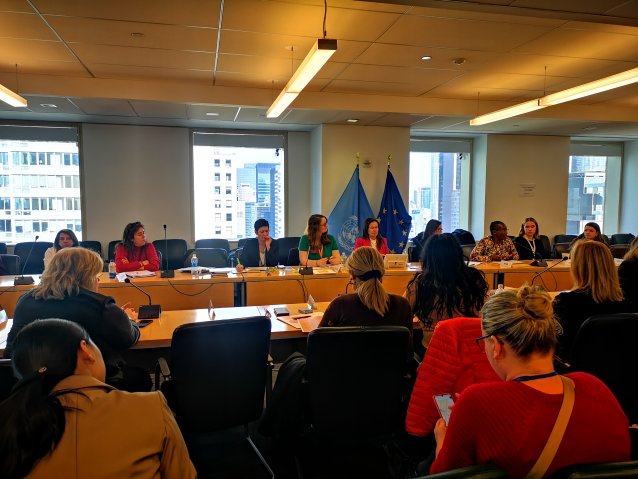
The second side event tackled the topic of feminist sexuality education as a tool of empowerment for women and girls and took place on 14 March. In this session, the EWL introduced its work on the feminist principles that sexuality education should encompass and the main outcomes of its project of training on feminist sexuality education. This training allowed to build capacities of youth advocates, educators, health service providers, political staff and other professionals from within 6 partners organisations (ICCAO Tanzania, E-WIN Nigeria, SRHR Africa Trust, WOSWA Kenya, Genit Care Africa Burkina Faso and World Future Active Burundi). It insisted on the fact that feminist sexuality education is a comprehensive and holistic tool for boys and girls that includes not only biological but also social, ethical, psychological, legal and historical material to assist in the development of healthy relationships and to support full access to SRHR.
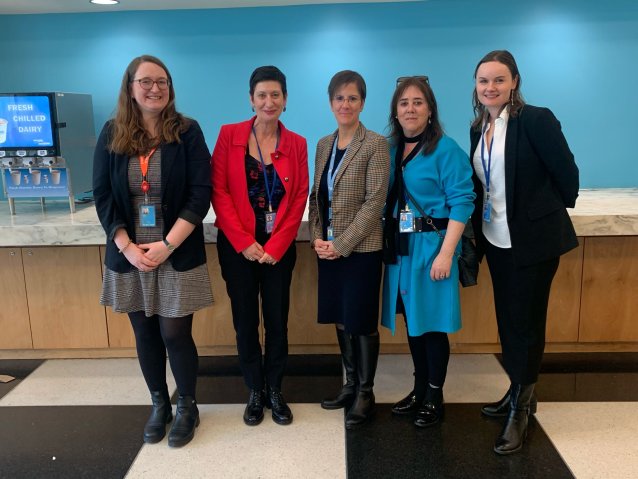
Additionally, the EWL delegation held meetings with key stakeholders such as the UN Special Rapporteur on violence against women and girls Reem Alsalem and took part in meetings organised by European Union delegations with Commissioner Helena Dalli to consult with civil society representatives. At this occasion, EWL President Iliana Balabanova conveyed our key messages on:
- The crucial fight for the abolition of prostitution and an end-demand approach to combat human trafficking, especially in the context of the UN CSW Theme of fighting poverty.
- The importance of representation of women and women’s rights organisations at every negotiation table; there is still a significant gap when it comes to the role of women during peace negotiations and the impact afterwards; EWL strongly advocate for women to be included in all aspects of peace-building in all current wars and conflicts and that international agreements and resolutions, such as UN Security Council Resolution 1325 on Women, Peace, and Security, recognising the importance of women’s participation in peacebuilding efforts are respected; When Women contribute to rebuilding communities and economies devastated by war, future conflicts are less likely to take place as societies are rebuilt in a more resilient way.
- The continued work for a Europe free from violence against women and girls we count on different pillars to work in unison - the Istanbul Convention, the Directive on VAW and DV, the Victim’s Rights Directive, the Anti-Trafficking Directive and to add one more pillar to this strong but improvable foundation we ask for the EU ratification of CEDAW, the Convention on the Elimination of All Forms of Discrimination Against Women. This international treaty gives a comprehensive foundation of the understanding of discrimination and advanced prevention and monitoring measures. The EU ratification of CEDAW would send a strong signal that the elimination of all forms of discrimination against women remains a priority at the top EU political level.
- In the context of the EU elections 2024, the need for a council formation on Gender Equality, a Commissioner for Gender Equality and a strong mandate on gender equality issues in the European Commission as well as the continuity of the Committee on Women’s Rights and Gender Equality in the European Parliament; all these structures will give a strong foundation for a Gender Equality Strategy after 2025.
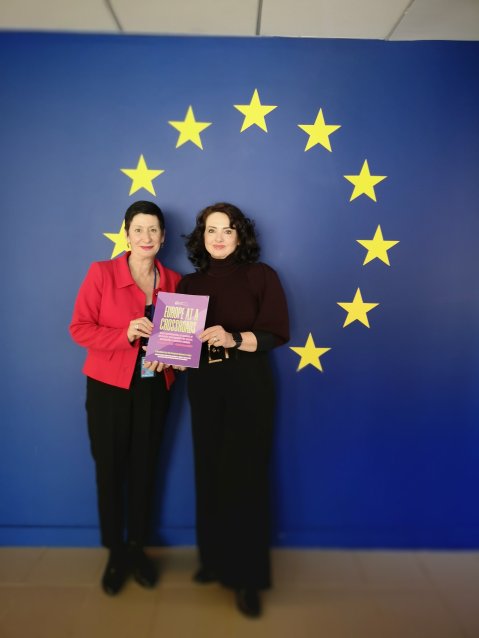
The EWL also analysed the Agreed Conclusions which clearly highlighted the link between the failure to address poverty factors affecting women and girls - such as the absence of economic opportunities and autonomy, the lack of access to economic resources, the lack of access to quality education and support services, women’s limited participation in decision-making processes - and how it results in women’s exclusion, discrimination and even to violence against them such as human trafficking and sexual exploitation. Additional factors such as natural disasters, climatic changes, wars and conflicts, lack of access to health, energy and food security are also recognised as elements that disproportionately affect women and girls, preventing them from fully enjoying their life and their human rights. Among the key measures suggested, the Commission urges governments to take the following measures:
- To integrate a gender perspective into financing for development commitments;
- To implement gender-responsive economic and social policies and strengthen public institutions;
- To expand a fiscal space for investments to end poverty for women and girls;
- To foster new development strategies towards sustainable economies and sustainable societies;
- To engage and finance women’s organisations and collectives;
- To enhance multidimensional poverty data and statistics.
Women’s organisations and the feminist movement are the guardians of agreed language to ensure the universality of women’s human rights. The UN must remain the bastion of human rights and progressive policies. Therefore, it is crucial that the Agreed Conclusions, while non-binding, are taken home and governments are held accountable for the implementation.




